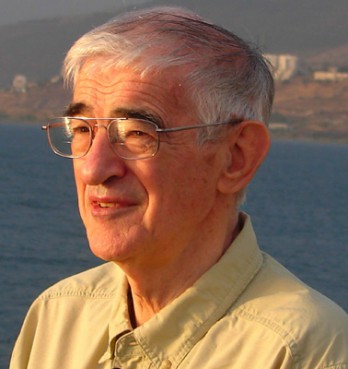
(RNS4-OCT21) John Dominic Crossan is the author of the new book, “The Greatest Prayer.” For use with RNS-10-MINUTES, transmitted Oct. 20, 2010. RNS photo courtesy HarperOne.
(RNS) John Dominic Crossan is arguably the world’s foremost scholar of the historical Jesus. Twenty-five years ago, Crossan co-founded the Jesus Seminar with Robert Funk, a group of mostly liberal scholars who decide on the historicity of the deeds and sayings of Jesus.
A former Roman Catholic priest and professor emeritus of religious studies at DePaul University, Crossan newest book — his 26th — looks at the Lord’s Prayer, or the Our Father. In “The Greatest Prayer,” Crossan argues that Christianity’s best-known invocation is misunderstood and undervalued in today’s society.
Some answers have been edited for length and clarity.
Q: You call the Lord’s Prayer Christianity’s “greatest prayer,” but also say it can be prayed by followers of all religions. Why would non-Christians recite it?
A: Any religion’s greatest prayers should be addressed to the whole world. If a prayer only speaks to you, that’s fine. But I would like to hear you speaking to all of us. The Lord’s Prayer is the greatest because it comes from the heart of Judaism and the lips of Christianity — but speaks to the conscience of the world.
Q: You also call it Christianity’s “strangest” prayer.
A: Ask a Christian what’s the most important things about Christianity, and see if you find those in the Lord’s Prayer. When Christians emphasize what’s most important for them, it’s usually not in the Lord’s Prayer, and they almost never mention that “give us this day our daily bread” means exactly that — that everyone has a right to the material basis of life. It’s “strange” in that there’s a huge discrepancy between what most people think Christianity is really about and what Jesus thinks Christianity is really about.
Q: The Lord’s Prayer addresses God as “Father.” Is that a turn-off for women?
A: It is, and they’re going to have to learn, as we all have to, what is meant by people who use a different culture than our own. Sheep and shepherds don’t do much for me, but I will allow ancient people the validity of their language.
When they say “Father,” I ask what that meant in the Mediterranean world, and it means “householder.” I accept the traditional term of “Father,” but I do not accept the patriarchal presuppositions. I say “Father” (but) I read “householder.” The most important point is that you understand what this metaphor stands for.
Q: Scholars have shown the Lord’s Prayer to come straight from the Jewish tradition. How did it become Christianity’s best-known prayer?
A: It is utterly, totally, fully Jewish. There’s nothing in there that’s particularly “Christian.” Do I think Jesus drilled his followers to learn the prayer as we have it in (the Gospels of) Matthew or Luke? I don’t think so, because I can’t find it in (the writings of) Paul. What I do find in Paul and (the Gospel of) Mark is the key word: “Abba” — the metaphor for God as householder. If you unpack that, everything else simply flows from it.
Q: What new light does all this shed on the historical Jesus?
A: If you had to summarize the historical Jesus, we are now down to a single word, almost an ecstatic proclamation: God is “Abba.” And God as householder is the way the ancient Jews and earliest Christians got their idea of how things should be run. They all knew what a well-run household looked like, and they made God the Big Householder in the Sky. What appalled them was not poverty or riches, but the discrepancy between them, the inequality.
I don’t think the Bible would worry if everyone was poor or if everyone was rich. What appalls the Bible is, how could you have a household with some (members) getting far more than others, and others getting far less than they need?
Q: Given America’s current climate, why hasn’t anyone said the Lord’s Prayer is a socialist prayer and we shouldn’t recite it?
A: I don’t think there’s much in the Our Father that isn’t in the Pledge of Allegiance, where we pledge ourselves to liberty and justice for all. If liberty and justice for all is not communism or socialism or liberalism, then the Bible is saying really not much more.
“Under God,” we say, with “liberty and justice for all.” That pretty much summarizes the Our Father and it summarizes the whole Bible. Nobody ever accuses the Pledge of Allegiance of socialism, communism and liberalism.




